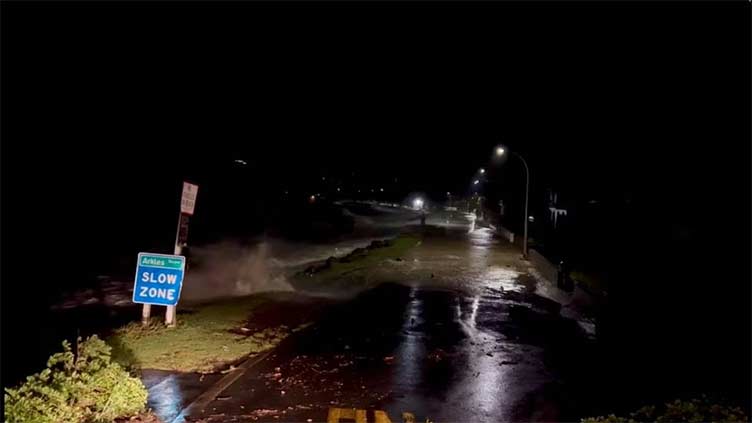New Zealand declares national emergency as Cyclone Gabrielle wreaks havoc

World
Cancelled flights stranded thousands of people, while hundreds of thousands remained without power.
WELLINGTON, (Reuters) - New Zealand declared a national state of emergency for only the third time in its history on Tuesday as Cyclone Gabrielle caused widespread flooding, landslides and huge ocean swells, forcing evacuations and stranding people on roof tops.
Cancelled flights stranded thousands of people, while hundreds of thousands remained without power.
"The severity and the breadth of the damage that we are seeing has not been experienced in a generation," Prime Minister Chris Hipkins told a news conference on Tuesday.
Australia and Britain had pledged support, he added.
At 6 p.m. (0500 GMT) Gabrielle had moved southeast of Auckland, near the east coast of the country's North Island, and was expected to continue moving southeast, roughly parallel to the coast. Weather warnings remained in place for much of the east coast of the North Island and upper South Island.
About 225,000 people were left without electricity, while dozens of supermarkets closed, with Hipkins urging New Zealanders not to panic-buy supplies.
Architect Lars von Minden, 50, lives in Muriwai, a beach town on the coast west of Auckland.
"I've seldom seen anything like it," he told Reuters by phone. "There are three or four areas where there are just these massive slips, some of them 300 metres (1,000 feet) across, that have come down, taking out houses and roads and everything."
Kieran McAnulty, minister of emergency management, said that while New Zealand was now through the worst of the storm, more rain and high winds were expected.
The country was suffering from extensive flooding, landslides and damage to roads and infrastructure, he added.
Transmission companies around the country reported damage to substations and power networks.
EVACUATIONS
Authorities have evacuated beach settlements and are urging still more people to leave homes as rivers continue to swell and huge surf inundates beachfront properties.
Roads are closed, mobile phone services down and some towns cut off. Residents in hard-hit areas are being asked to conserve water and food because of fears of shortages. Air New Zealand restarted some flights in and out of Auckland, though many routes remained disrupted.
Helicopter and boat crews were rescuing people trapped by rapidly rising flood water in Hawke's Bay, southeast of Auckland.
Hipkins said it was too early to say how many people had been displaced or injured. No deaths have been confirmed.
Media reported one person was missing after a house had slid down a hill in Hawke's Bay, while the fire and emergency service said a volunteer firefighter was still in a house that had been swept downhill in a landslide.
Local media published photographs and video of people sitting on top of buildings surrounded by flood water, of houses swept to the bottom of hills by landslides and of roads under water.
A New Zealand warship rescued a person from a yacht that turned on its emergency beacon this morning off the east coast.
New Zealand declared national emergencies after an earthquake in 2011 and when the COVID-19 pandemic hit in 2020.

